Hello, I’m Kaike Zhang (张凯科), an phD student at the Institute of Computing Technology, Chinese Academy of Sciences. My research interest includes trustworthy recommender system and LLM safety.
🔥 News
-
2025.11: We will organize the 2nd Workshop on Human-Centered Recommender Systems (HCRS) at The Web Conference (WWW 2026) in Dubai, UAE.
-
2025.10: I was awarded the National Scholarship for Doctoral Students.
-
2025.10: Our recent work is now available on arXiv: GoalRank: Group-Relative Optimization for a Large Ranking Model.
-
2025.09: 🎉🎉 Our paper Data Usage Privacy Auditing for Semi-supervised GNNs is accepted to ACM SIGIR-AP 2025.
-
2025.09: Our new work has been released on arXiv: From Generation to Consumption: Personalized List Value Estimation for Re-ranking.
-
2025.07: 🎉🎉 Our paper Robust Recommender System: A Survey and Future Directions is accepted in ACM CSUR.
-
2025.04: We organized The 1st Workshop on Human-Centered Recommender Systems (HCRS), held on April 29, 2025, at The Web Conference (WWW 2025) in Sydney, Australia.
-
2025.04: 🎉🎉 Our paper “I Know You Are Discriminatory!”: Automated Substantiating for Individual Fairness Auditing of AI Systems is accepted in CSCW 2025.
-
2025.01: 🎉🎉 Our paper Personalized Denoising Implicit Feedback for Robust Recommender System is accepted in TheWebConf (WWW) 2025.
-
2024.12: I received the Huawei PhD Scholarship in 2024.
-
2024.09: 🎉🎉 Our paper Understanding and Improving Adversarial Collaborative Filtering for Robust Recommendation is accepted in NeurIPS 2024.
-
2024.08: 🎉🎉 Our paper PKAD: Pretrained Knowledge is All You Need to Detect and Mitigate Textual Backdoor Attacks is accepted in EMNLP 2024.
-
2024.07: 🎉🎉 Our paper Improving the Shortest Plank: Vulnerability-Aware Adversarial Training for Robust Recommender System is accepted in RecSys 2024.
-
2024.07: 🎉🎉 Our paper Accelerating the Surrogate Retraining for Poisoning Attacks against Recommender Systems is accepted in RecSys 2024.
-
2024.04: 🎉🎉 Our paper LoRec: Combating Poisons with Large Language Model for Robust Sequential Recommendation is accepted in SIGIR 2024.
-
2023.05: 🎉🎉 Our paper DyTed: Disentangled Representation Learning for Discrete-time Dynamic Graph is accepted in SIGKDD 2023.
📝 Publications
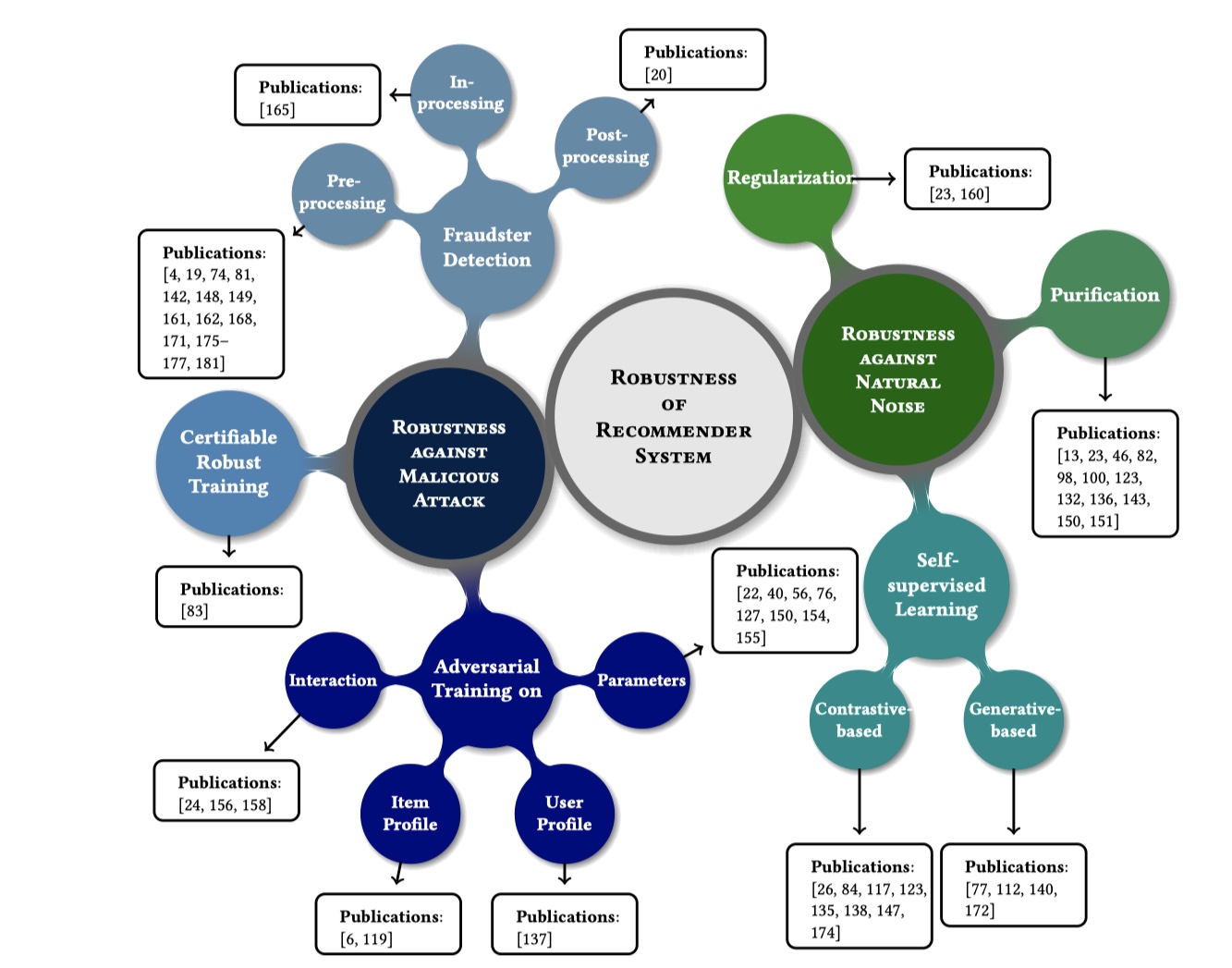
Robust Recommender System: A Survey and Future Directions Kaike Zhang, Qi Cao, Fei Sun, Yunfan Wu, Shuchang Tao, Huawei Sheng, Xueqi Cheng
- A comprehensive and systematic taxonomy for robustness-enhance methods in recommender systems.
- An all-encompassing overview of the representative methodologies, as well as evaluation approaches and datasets currently employed in the domain.
- Detailed discussions encompass various facets: the main consideration of recommender systems’ robustness in diverse scenarios, its correlation with other trustworthy properties of recommender systems, as well as open issues coupled with recommender systems’ robustness, and trends for future development.
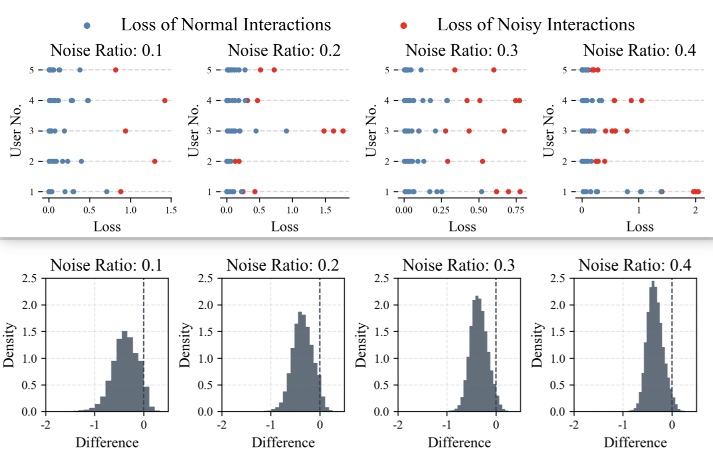
Personalized Denoising Implicit Feedback for Robust Recommender System Kaike Zhang, Qi Cao, Yunfan Wu, Fei Sun, Huawei Shen, Xueqi Cheng
- We identify the limitations of existing loss-based denoising methods, highlighting the significant overlap between normal and noisy interactions in the overall loss distribution.
- We find that, for a given user, there is a clear distinction between normal and noisy interactions in the user’s personal loss distribution. Leveraging this insight, we propose a resampling strategy for denoising, PLD.
- We conduct an in-depth theoretical analysis, proving PLD’s effectiveness and suggesting ways to further enhance its performance.
(Code)

“I Know You Are Discriminatory!”: Automated Substantiating for Individual Fairness Auditing of AI Systems Yuanhao Liu, Qi Cao, Huawei Shen, Kaike Zhang, Yunfan Wu
- We propose substantiating as a framework for individual fairness auditing of AI systems, which is a solution for situations where auditors lack access to model information and data.
- To the best of our knowledge, we are the first to propose the utilization of automated data generation methods for individual fairness audits, and we designed two categories of methods.
- We conduct experiments on four public datasets to evaluate our methods. Additionally, the experiment on GPT-4 shows the effectiveness of our substantiating framework for individual fairness auditing.
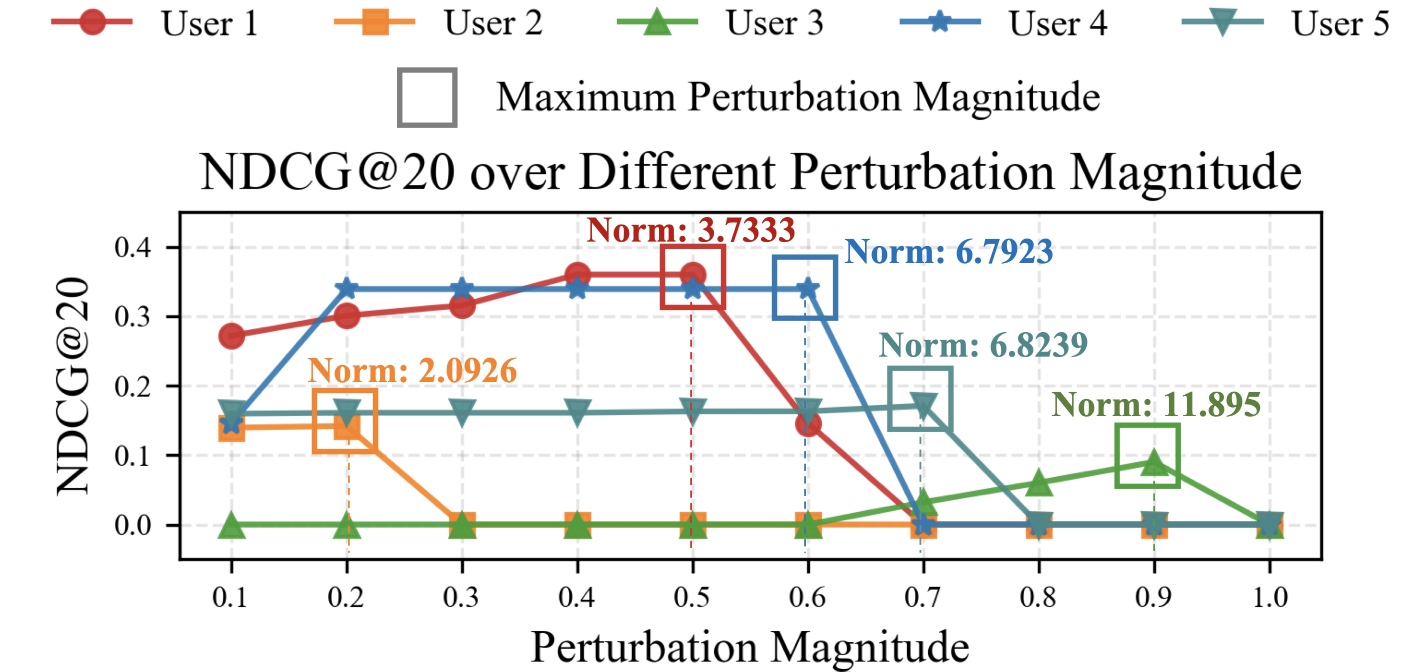
Understanding and Improving Adversarial Collaborative Filtering for Robust Recommendation Kaike Zhang, Qi Cao, Yunfan Wu, Fei Sun, Huawei Shen, Xueqi Cheng
- We provide theoretical evidence that ACF can achieve better performance and robustness compared to traditional CF in both clean and poisoned data contexts.
- We further identify upper and lower bounds of reduction in recommendation error for ACF during optimization and demonstrate that applying personalized perturbation magnitudes for each user can further improve ACF.
- Based on the above theoretical understandings, we propose Personalized Magnitude Adversarial Collaborative Filtering (PamaCF), with extensive experiments confirming that PamaCF further improves both performance and robustness compared to state-of-the-art defense methods.
(Code)

PKAD: Pretrained Knowledge is All You Need to Detect and Mitigate Textual Backdoor Attacks Yu Chen, Qi Cao, Kaike Zhang, Xuchao Liu, Huawei Shen
- We delve into utilizing PLM insights to identify the mismatched relationship and shared characteristics of poisoned samples, forming a two-stage detection strategy.
- Through extensive experiments, we demonstrate our approach’s effectiveness across various datasets and attack strategies, achieving better performance more swiftly.
(Code)
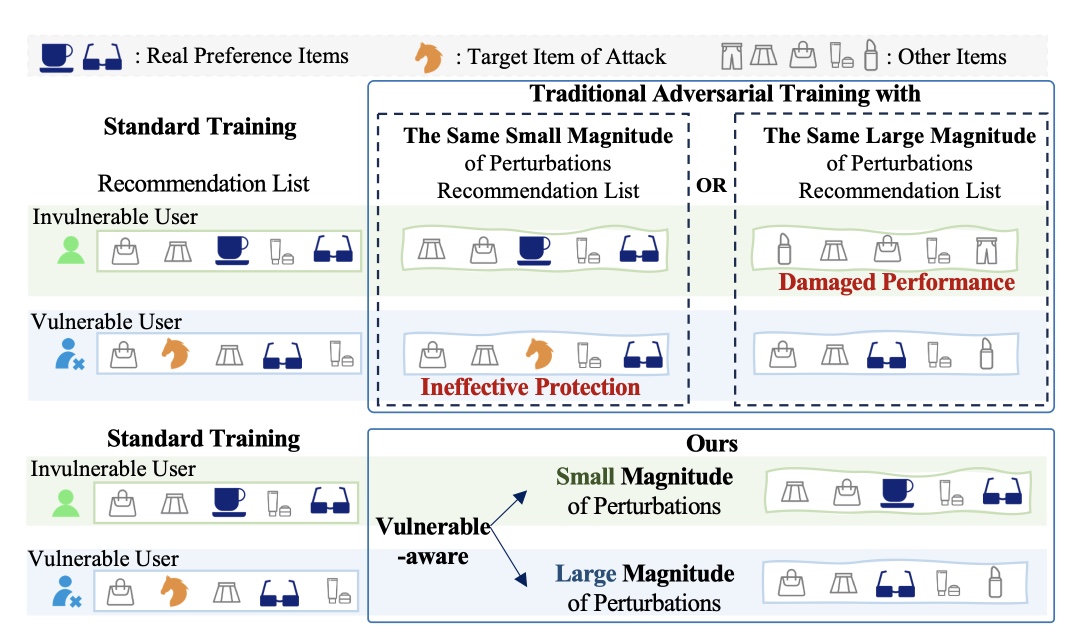
Improving the Shortest Plank: Vulnerability-Aware Adversarial Training for Robust Recommender System Kaike Zhang, Qi Cao, Yunfan Wu, Fei Sun, Huawei Shen, Xueqi Cheng
- Through extensive empirical analysis, we interestingly find that “users with a higher degree of fit within the recommender system are at a higher risk of being affected by attacks”.
- Building on these insights, we introduce a novel vulnerability-aware adversarial training method, VAT, applying user-adaptive magnitudes of perturbations based on users’ vulnerabilities.
- Our comprehensive experiments confirm the effectiveness of VAT in resisting various attacks, maintaining recommendation quality, and demonstrating its adaptability across various recommendation models.
(Code)
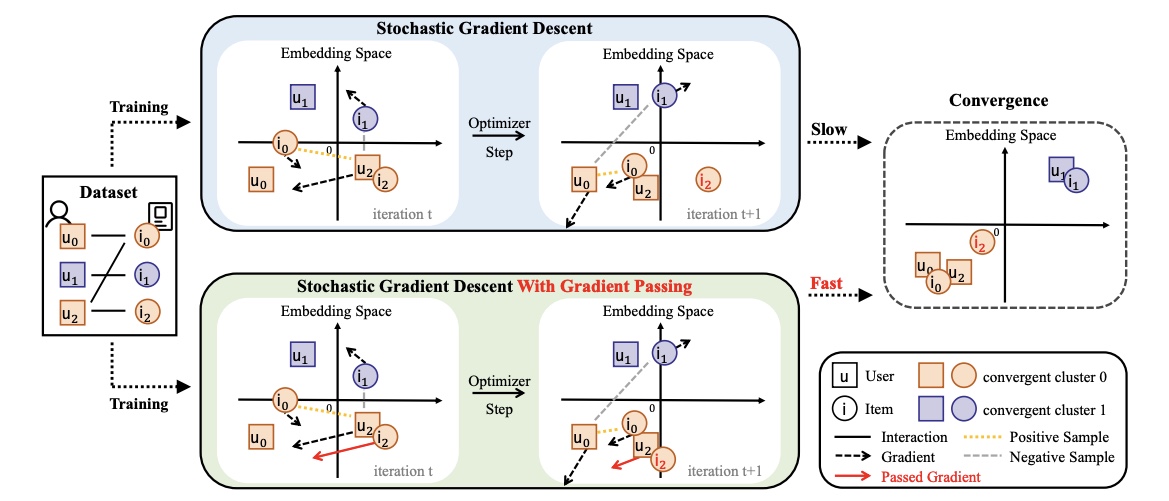
Accelerating the Surrogate Retraining for Poisoning Attacks against Recommender Systems Yunfan Wu, Qi Cao, Shuchang Tao, Kaike Zhang, Fei Sun, Huawei Shen
- We introduce a novel method Gradient Passing (GP) based on both intuitive and theoretical analyses, accelerating the retraining process of surrogate recommenders.
- We present the use of GP to enhance data poisoning attacks. It can be integrated into state-of-the-art attack methods and combined with other techniques.
- Extensive experiments on three real-world datasets and six victim recommenders validate the efficiency and effectiveness of GP.
(Code)
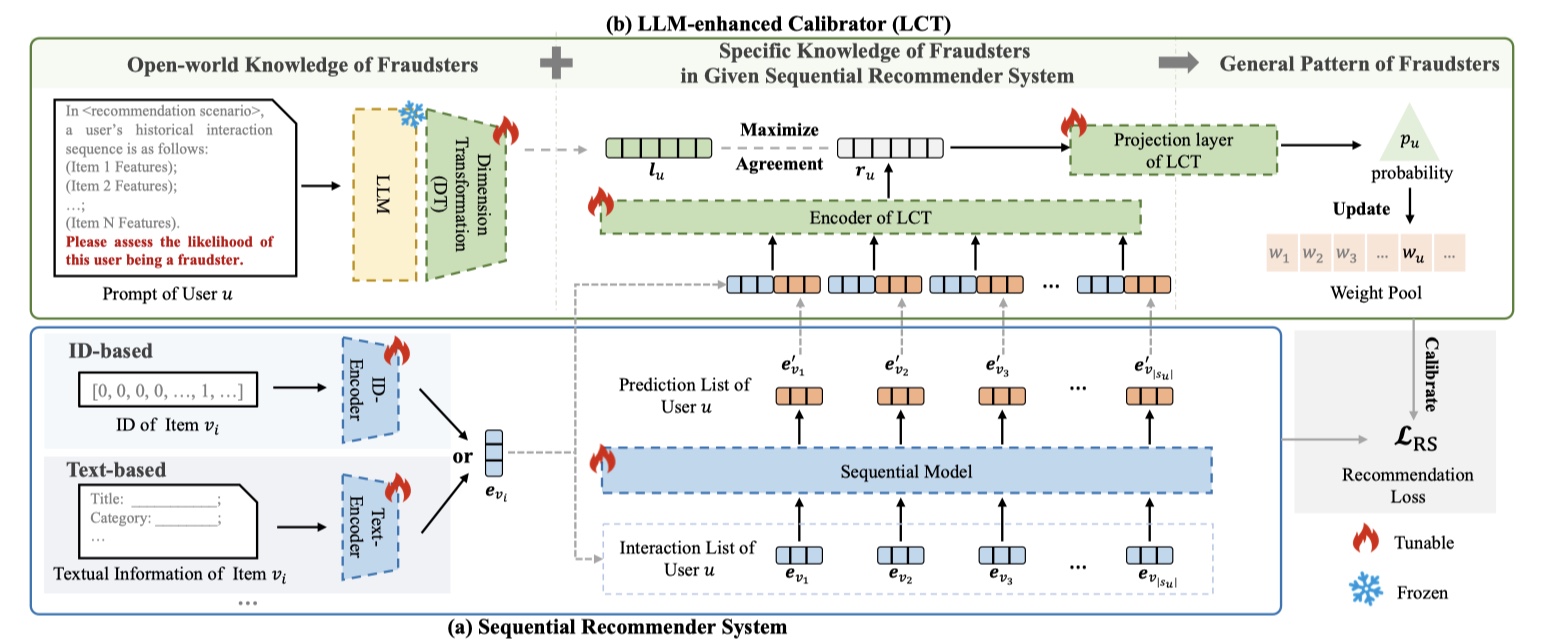
LoRec: Combating Poisons with Large Language Model for Robust Sequential Recommendation Kaike Zhang, Qi Cao, Yunfan Wu, Fei Sun, Huawei Sheng, Xueqi Cheng
- We pioneer the exploration of LLMs’ knowledge of fraudsters within recommender systems, revealing how LLMs’ knowledge can aid defense methods in generalizing across various attacks.
- We lead the initiative of incorporating LLMs into the robustness of sequential recommender systems, introducing LoRec as an innovative and general framework that employs LLM-enhanced Calibration for robust sequential recommendations.
- Our extensive experiments confirm the efficacy of the LoRec framework in withstanding diverse types of attacks and its adaptability across multiple backbone recommendation architectures.
(Code)
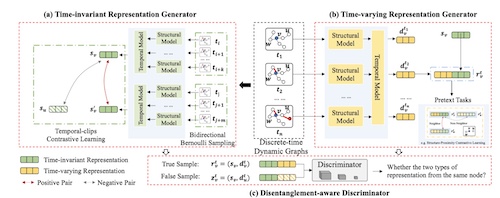
DyTed: Disentangled Representation Learning for Discrete-time Dynamic Graph Kaike Zhang, Qi Cao, Gaolin Fang, Bingbing Xu, Hongjian Zou, Huawei Sheng, Xueqi Cheng
- To the best of our knowledge, we are the first to study and introduce the disentangled representation learning framework for discrete-time dynamic graphs.
- We propose two representation generators with carefully designed pretext tasks and a disentanglement-aware discriminator under an adversarial learning framework.
- We conduct extensive experiments on real dynamic graphs of daily capital transactions on Tencent, achieving state-of-the-art performance on various downstream tasks.
(Code)
📖 Preprints
🎖 Honors and Awards
_ 2025 National Scholarship for Doctoral Students. _ 2025 Institute of Computing Technology 3A Student.
- 2024 Huawei PhD Scholarship.
- 2024 NeurIPS Scholar Award.
- 2024 Institute of Computing Technology 3A Student Leader.
- 2023 Institute of Computing Technology 3A Student.
- 2022 Institute of Computing Technology Director’s Named Scholarship.
- 2021 Excellent Undergraduate Graduation Design of Chongqing University.
- 2021 Outstanding Undergraduate Graduates.
- 2019 Second Prize of the National College Student Mathematical Modeling Competition of China (Chongqing).
- 2018 Second prize in the National College Student Mathematics Competition of China.
📖 Educations
- 2021.09 - Present, Institute of Computing Technology, Chinese Academy of Seiences.
- Consecutive MS and phD in Computer Application Technology and Cyberspace Security
- Tutor: Professor Xueqi Cheng and Xinran Liu
- 2017.09 - 2021.06, Chongqing University.
- BS in Software Engineering
- Tutor: Professor Haibo Hu
